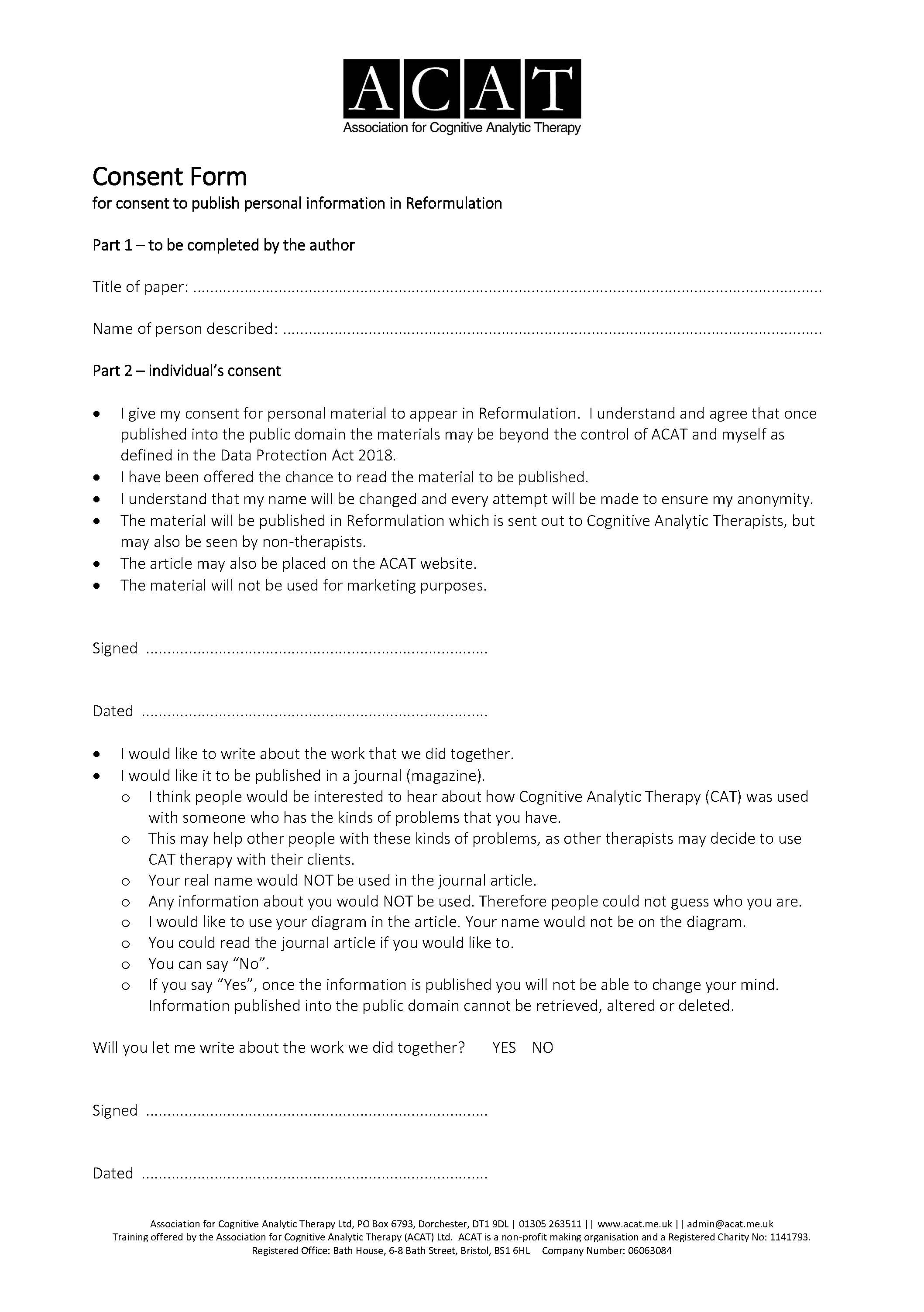Web-site restrictions
ACAT is moving to a new website shortly. Due to unforeseen technical issues, the launch has been postponed briefly until Tuesday, 6th May.
In preparation, this website no longer lets members renew their membership. ACAT Administration are likewise unable to process membership renewals until the new site opens.
Please do not update any personal details on your member/friend profile, as changes at this point will not be transferred to the new site.
Thank you for your patience, and we look forward to welcoming you to a new website after the Early May bank holiday.
Consent to Publish in Reformulation
This article is a description of the consent requirements for authors submitting articles that describe detailed clinical material about clients. Our aim is to remind authors of the need to get informed consent from the client for publication of any clinical material in Reformulation, and, also, to provide two types of consent form that can be photocopied and used by authors. All authors must gain written consent for their submission of case material. The consent form should be submitted with the article so that the editors can be sure that it has been obtained. It is not enough to disguise the individual by changing names or details, as the individual, and their relatives, would still be able to identify themselves and could be distressed and make a complaint. This policy on consent applies not just within ACAT and to Reformulation, but to all scientific publications. There may also be specific policies in place by the author’s employing organisation or professional body, and authors are welcome to use consent forms from these sources if they wish.
It is recognised that some clients’ capacity to give consent is impaired or legally deemed absent, for example, some people with learning disabilities, brain injury, or a dementia. However, it is important that work with these more disabled clients can be published. A blanket ban on publication, in these circumstances, denies the voice of those clients and may contribute to an assumption that such clients cannot have CAT. Guidance on capacity and how to seek consent in people whose capacity is impaired is given in the Department of Health’s Good Practice in Consent Implementation Guide (2001).
No one else can give consent on behalf of an adult who lacks capacity and all attempts should be made to gain the client’s consent. At the very end of this article we have included an example of a consent form designed specifically for an article in this issue of Reformulation for an individual with learning difficulties and this could be used as a model for others (Nicola Murphy, 2008). In these circumstances, it would also be good practice to involve the client’s carer, relative, or an advocate in a decision to write case material about the client and they could also sign the consent form to show that they have no objections.
Although children acquire rights to give consent for themselves as they grow older, and are deemed to be competent from the age of 16, parents retain the right to give consent on the child’s behalf until they are 18. For a number of years, both the child and the parent have the right to give consent, since children under 16 who have sufficient understanding and intelligence to enable them to understand fully what is proposed are also regarded as competent to consent. Best practice would suggest that the writer should seek consent from both the child and his or her parent to publish the material, but the child’s view would be paramount. (Detailed information is given in the Department of Health’s Guide referred to above).
Authors should ensure that the client is given a copy of the consent form with an address and contact number should they wish to withdraw consent at a later time. A copy of the consent form should be placed in the client’s file. The client should be offered the opportunity to read the article if he/she wishes.
References
For more details, authors may wish to refer to the codes of practice below:
- The Division of Clinical Psychology Professional Practice Guidelines
- The Department of Health’s code of practice re confidentiality (Department of Health, 2003)
- Good Practice in Consent Implementation Guide (Department of Health, 2001)
- Department of Health guidance documents, Reference Guide to consent for examination or treatment, 2001
- 12 Key Points on Consent: the law in England, 2001
- Consent-What you have a right to expect (2001), leaflets for patients, with versions for adults, children/young people, people with learning disabilities, parents and relatives/carers
- Seeking Consent: working with children (2001)
- Seeking Consent: working with older people (2001)
- Seeking Consent: working with people with learning disabilities (2001)
Alison Jenaway and Julie Lloyd
Consent to Publish Forms
The forms below can be used as examples. Click the image to open a PDF file of the form (506kb).


CPD Event: CAT and Reflective Practice: Skills for Facilitation - offered by Catalyse
CPD Event: EDI Race and Culture CPD workshop - offered by CAT Cumbria
CPD Event: ACAT: The embodiment of reciprocal roles as a reflective
ACAT Annual Conference: 29th ACAT National Conference
ACAT AGM: Annual General Meeting
ACAT Annual Conference: ACAT National Conference 2025
CAT Vacancies
Click to view VacanciesNews from ACAT
Help
This site has recently been updated to be Mobile Friendly. We are working through the pages to check everything is working properly. If you spot a problem please email support@acat.me.uk and we'll look into it. Thank you.


